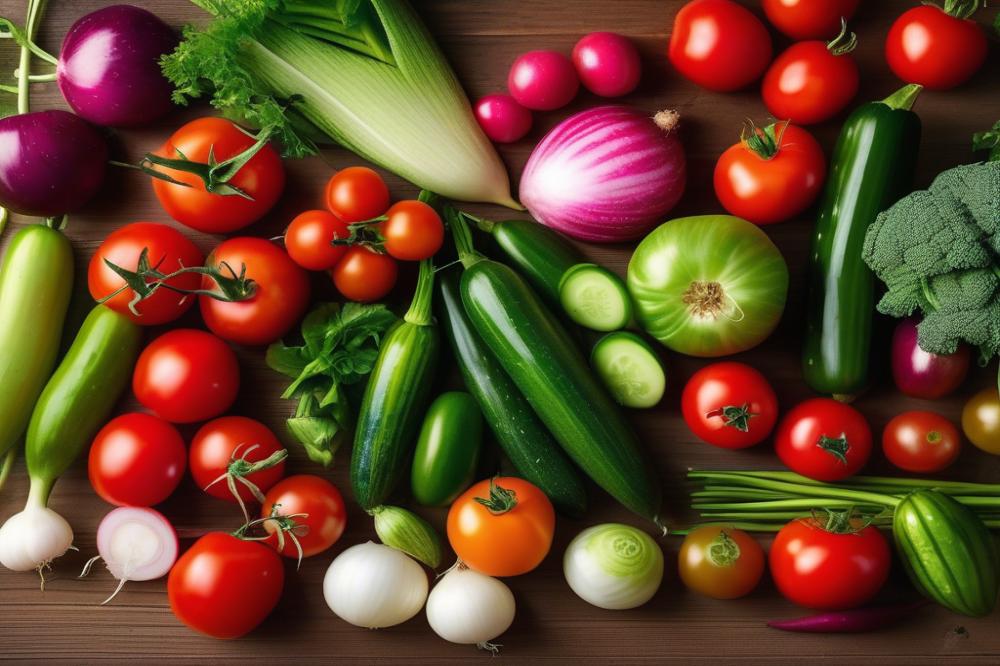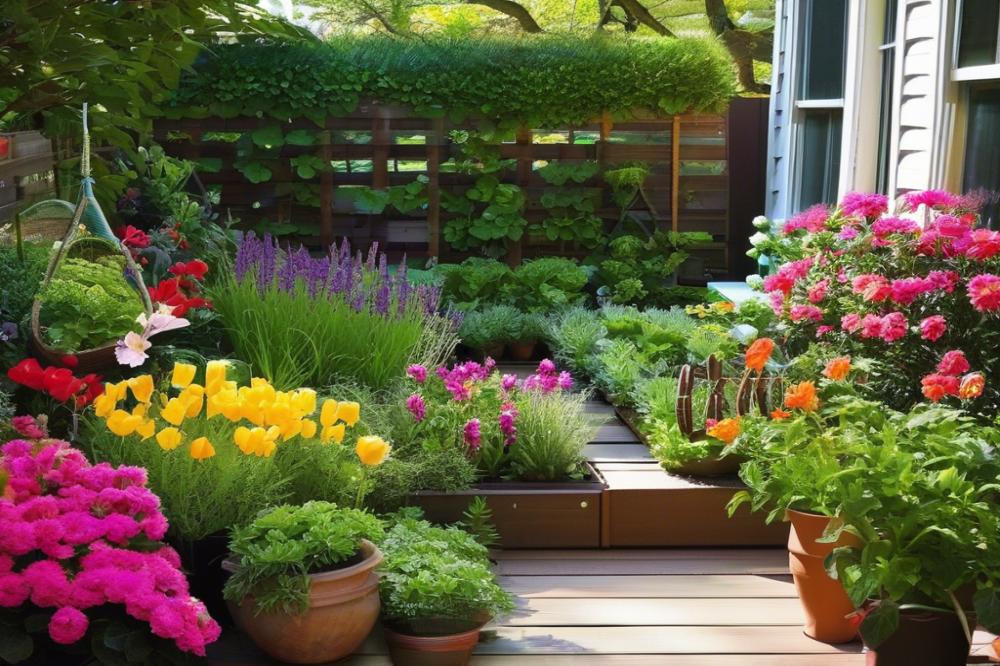Choosing the Right Vegetables: A Key to Success
Launching into gardening is an exciting journey. The choice of what to plant is crucial, especially for beginners. It can set the tone for your entire vegetable garden experience. Selecting the right crops can lead to a sense of accomplishment and enjoyment. When you grow easy-to-grow vegetables, you will likely see quicker results. This can motivate you to continue your gardening adventure.
Home gardening offers numerous benefits. Fresh, homegrown produce enhances meals and promotes a healthier lifestyle. Additionally, it can save money. Special attention should be given to starter vegetables. They are forgiving and adapt well to beginner gardening. Some options thrive in different growing methods, like raised bed gardening or container gardening.
Focusing on suitable varieties facilitates plant care. Learning about seasonal vegetables will broaden your gardening knowledge. Healthy plants are essential for productive growth. Understandably, managing expectations is important. Not every seed will sprout, and that’s alright. Each attempt gifts you valuable gardening tips for the next round.
Taking these first steps can make a difference. When beginners see their hard work pay off, it encourages them to keep going. Choose vegetables for beginners wisely to cultivate that enthusiasm. Soon enough, you’ll find yourself yearning for the next planting season.
Understanding Your Environment
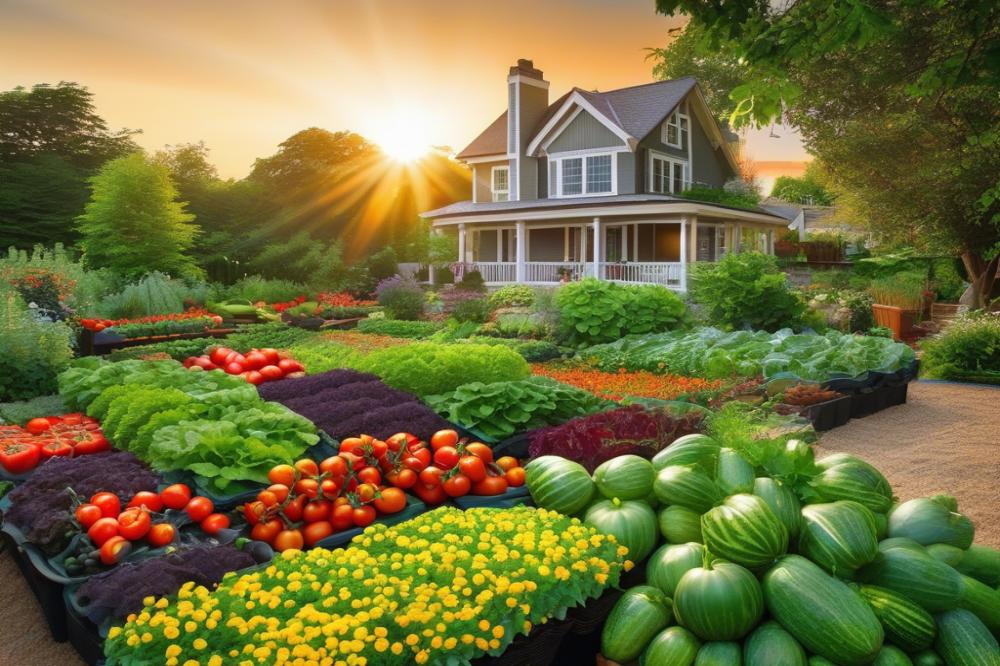

When embarking on your journey into gardening, the first step is to understand your environment. Climate plays a significant role in what vegetables thrive. Some plants need hot weather to flourish, while others are more suited for cooler temperatures. Research the climate in your area. This will guide your choices when selecting the best starter vegetables.
Soil type matters too. Certain vegetables prefer sandy soils, while others thrive in clay. Testing your soil can provide insights into its pH and nutrient levels. Consider adding organic matter or compost to enrich your soil, which enhances plant care and boosts growth.
Available space can also influence your decision. If you have a large yard, a traditional vegetable garden might appeal to you. However, for those with limited space, raised bed gardening or container gardening can work wonders. Each approach has its perks. Raised beds offer better drainage, while containers provide flexibility to move plants as needed.
Let’s talk about seasonal vegetables. Different crops grow best in specific seasons. Knowing which ones suit your local climate will make choosing vegetables much easier. Some crops can be grown in both spring and fall, maximizing your yield.
Consider factors like sunlight exposure too. Most vegetables need at least six hours of sunlight daily. Be mindful of shadows from trees or buildings that might affect growth. Pay attention to where light hits your garden space.
Incorporating beginner gardening tips can dramatically improve your experience. Start with simpler crops such as lettuce, radishes, or tomatoes. These vegetables are often forgiving and can boost your confidence as you learn. They also require less intricate care compared to other types.
Overall, your environment shapes your gardening journey. Take the time to evaluate it thoroughly. This knowledge will lead to a flourishing home gardening experience.
Top Starter Vegetables
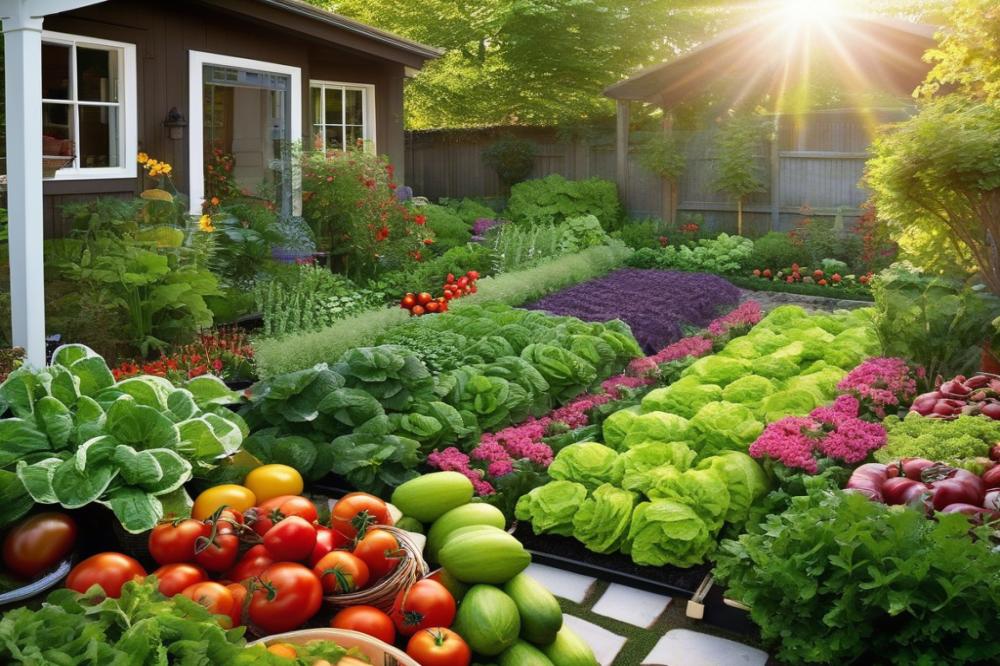

Growing vegetables can be a rewarding hobby for anyone. Beginners often feel overwhelmed, but certain vegetables are easier to cultivate. Let’s explore some of the best options for those just starting out in their vegetable garden.
Tomatoes
Few vegetables are as popular as tomatoes. They thrive in warm weather and require plenty of sunlight. Plant care involves regular watering and occasional staking for support. Harvesting usually happens within 60 to 85 days. Fresh tomatoes taste incredible and will make your efforts worthwhile.
Cucumbers
Cucumbers are a refreshing addition to any garden. They grow quickly and can be planted directly in the soil or in containers. These plants need consistent moisture, so regular watering is essential. Typically, you can harvest cucumbers in as little as 50 to 70 days from sowing.
Radishes
Radishes are one of the fastest-growing vegetables around. They can sprout within just a few days. As a beginner, you’ll appreciate how little care they need. Regular watering helps, but these plants aren’t too fussy. With a quick turnaround of about 25 to 30 days, radishes offer instant gratification.
Lettuce
Lettuce is perfect for beginner gardening. Various types can be grown, including romaine and leaf varieties. This vegetable prefers cooler temperatures, making it ideal for spring and fall planting. You can enjoy your first harvest within 30 to 60 days after planting. Maintaining consistent moisture is key for tender, crisp leaves.
Bell Peppers
Bell peppers are colorful and versatile starter vegetables. They love warmth and grow best in sunny spots. Plant care includes regular watering and monitoring for pests. The wait is about 70 to 90 days before you can pick your peppers. Fresh bell peppers add a delightful crunch to many meals.
Green Beans
Green beans are fun to grow and require little effort. There are bush varieties and climbing types, offering flexibility in your garden setup. These plants thrive with full sun and benefit from regular watering. You’ll be ready to harvest within 50 to 70 days, adding fresh green beans to your table.
Carrots
Carrots are another fantastic choice. They can be grown in raised bed gardening or even in deep containers. Patience is needed since they take 70 to 80 days to mature. Keeping the soil moist helps with growth. Harvesting can be a fun surprise, as you uncover the colorful roots beneath the soil.
Each of these vegetables is perfect for beginners. They require basic care and can thrive in various setups, whether in a garden bed or through container gardening. Following these gardening tips will set you up for success as you embark on your home gardening journey. Start small, and watch your love for growing vegetables blossom!
Essential Gardening Tips
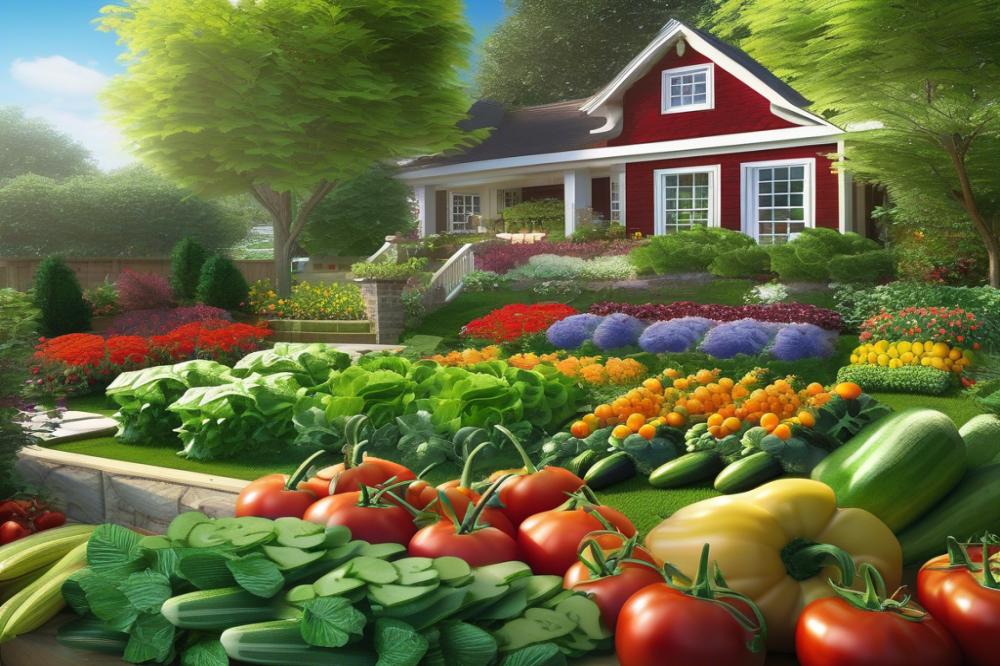

Starting a vegetable garden can be exciting and rewarding. First, let’s discuss watering. Plants need moisture, but not too much. Regularly check the soil. If it’s dry about an inch down, it’s time to water. Early mornings are the best time to do this. Moisture lasts longer when the sun isn’t at its peak.
Next comes fertilization. Starter vegetables thrive with the right nutrients. Use a balanced fertilizer during the growing season. This supports healthy growth. Every few weeks, apply again to keep your plants strong. Follow package instructions for dosages. Over-fertilizing can harm your beloved plants.
Pest control is also essential in home gardening. Watch out for bugs that might eat your greens. You can hand-pick pests off your plants if you find any. Introducing beneficial insects like ladybugs can help. They eat the bad bugs naturally. For bigger problems, use organic sprays, but always read the directions.
As for plant care, keep your garden tidy. Remove any weeds that pop up. Weeds compete with your vegetables for nutrients and space. Also, ensure you provide support for taller plants, like tomatoes, as they grow. Staking them helps maintain their health.
Pay attention to seasonal vegetables suitable for your area. Different plants thrive in specific conditions. Do some research on what to plant in spring versus fall. This knowledge will boost your chances of success in growing vegetables. Adjust your care routine according to the season. Cooler months require different attention than warm ones.
Raised bed gardening offers excellent drainage and soil management. If you choose this method, create a bed that’s at least a foot high. This helps control weeds and pests. Container gardening is another option. It allows you to grow your favorite vegetables in small spaces. Just make sure your containers have proper drainage holes.
Being a beginner means you’ll learn as you go. Don’t hesitate to ask for advice from local gardening clubs or online forums. Sharing experiences can lead to valuable insights. Soon enough, you’ll see the fruits of your labor, both literally and figuratively.
Planning Your Vegetable Garden
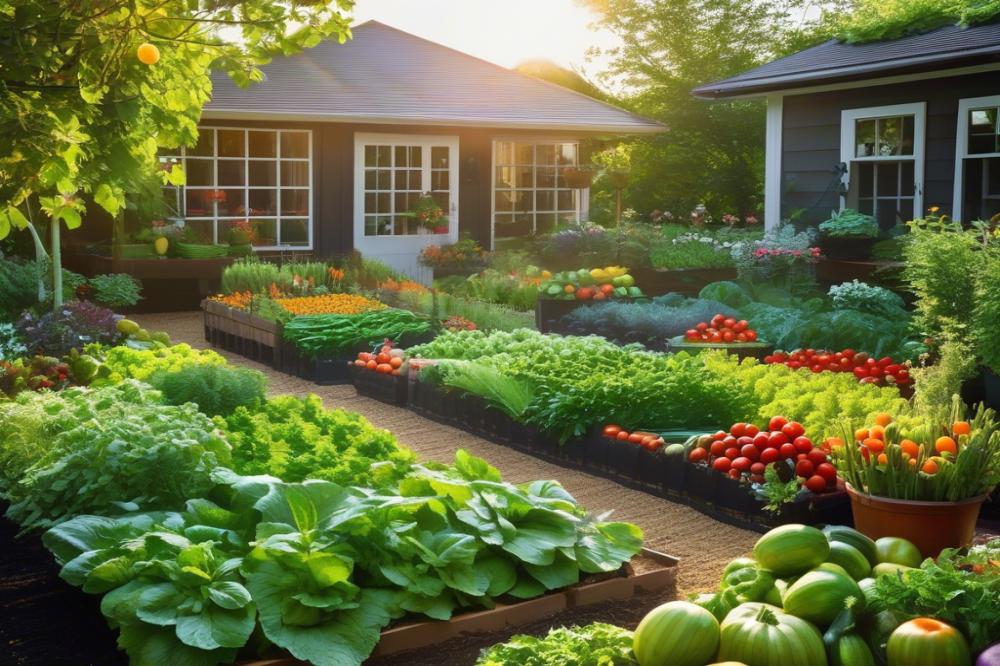

Planning a vegetable garden can be exciting. Start by choosing a sunny spot. Most plants need at least 6 hours of sunlight daily. Next, think about the layout of your garden. You’ll want to keep taller plants away from shorter ones. This will allow all your plants to receive adequate light.
Crop rotation is another essential consideration. Rotating crops helps prevent diseases and pests from becoming established in your garden. For example, if you grow tomatoes in one area this year, plant beans in that spot next year. This practice keeps the soil healthy and can lead to better yields.
Companion planting can boost your garden’s productivity. Some plants thrive when they are grown together. For instance, tomatoes and basil are great companions. They attract beneficial insects and can improve each other’s flavors. Incorporating companion plants not only helps with plant care, but it also makes your garden more diverse.
When it comes to spacing, give your starter vegetables enough room to grow. Crowded plants compete for nutrients and water. Check the seed packets or plant tags for specific spacing recommendations. Popular choices for beginner gardening include cucumbers and lettuce, which can be grown either in the ground or in raised bed gardening.
Lastly, consider a watering strategy. Consistent moisture supports healthy growth. If you’re growing vegetables in containers, be sure they have good drainage. Seasonal vegetables may need different care, so pay attention to weather patterns as you plan. Use these gardening tips to create a thriving vegetable garden right at home.
Common Mistakes and How to Avoid Them
Starting a vegetable garden can feel overwhelming, especially for beginners. Many new gardeners make simple mistakes that can harm their plants. Addressing these errors early can lead to a thriving garden full of delicious produce. Here are some common pitfalls and practical solutions.
Overwatering is a frequent issue. Many beginners believe that more water means healthier plants. In reality, too much moisture can drown roots and lead to root rot. To avoid this, check soil moisture regularly. Stick your finger about an inch into the soil. If it feels dry, it’s time to water. Adjust your watering schedule based on rainfall and temperature.
Under-fertilization often occurs when gardeners think that nature provides everything needed. This can stunt growth and limit vegetable yields. Use balanced fertilizers during the growing season for your starter vegetables. Follow package instructions carefully. Organic options are also available and beneficial for your vegetable garden.
Neglecting plant health can lead to disastrous results. Plants are like people; they need care and attention. Inspect leaves and stems regularly for pests or diseases. If you notice any issues, treat them promptly to prevent a full-blown infestation. Utilize gardening tips to learn more about specific plant care needs.
Home gardening can be a rewarding endeavor, but patience is key. Don’t expect perfect results right away. Each season offers lessons. Understanding when to plant seasonal vegetables is essential for success. Some crops do better when sown directly into the soil while others can thrive in raised bed gardening or container gardening.
Being mindful of your garden’s water, nutrients, and plant health will set you up for success. So, ask questions if you’re unsure about anything. Local gardening clubs and online forums can provide excellent resources. Help is always available for those willing to ask.
Time to Start Your Gardening Journey
Growing your vegetables for beginners is a rewarding experience. You don’t need to be an expert to enjoy the benefits of home gardening. Each small step you take can lead to big rewards. Starter vegetables like lettuce, radishes, and tomatoes are perfect for those just getting started. They’re easy to cultivate and offer quick results.
Imagine stepping outside to harvest your own fresh produce. The satisfaction of preparing a meal with ingredients you’ve nurtured yourself is unmatched. With every seed you plant, you invest time and care. Those moments in the garden can also provide a peaceful escape from everyday life.
Using simple gardening tips can transform your experience. Just remember to start with manageable tasks. Water your plants regularly and make sure they receive enough sunlight. As you watch them grow, you will feel a sense of accomplishment. It can create a hobby that leads to a lifetime of enjoyment.
Now is the time to take action. Grab a few seeds, prepare your soil, and dive into this adventure. Don’t worry about making mistakes; each garden is a learning experience. Celebrate every little success and remember that patience is key. You might discover a passion you never knew you had. Start your vegetable garden today and embrace all the joys it brings!

